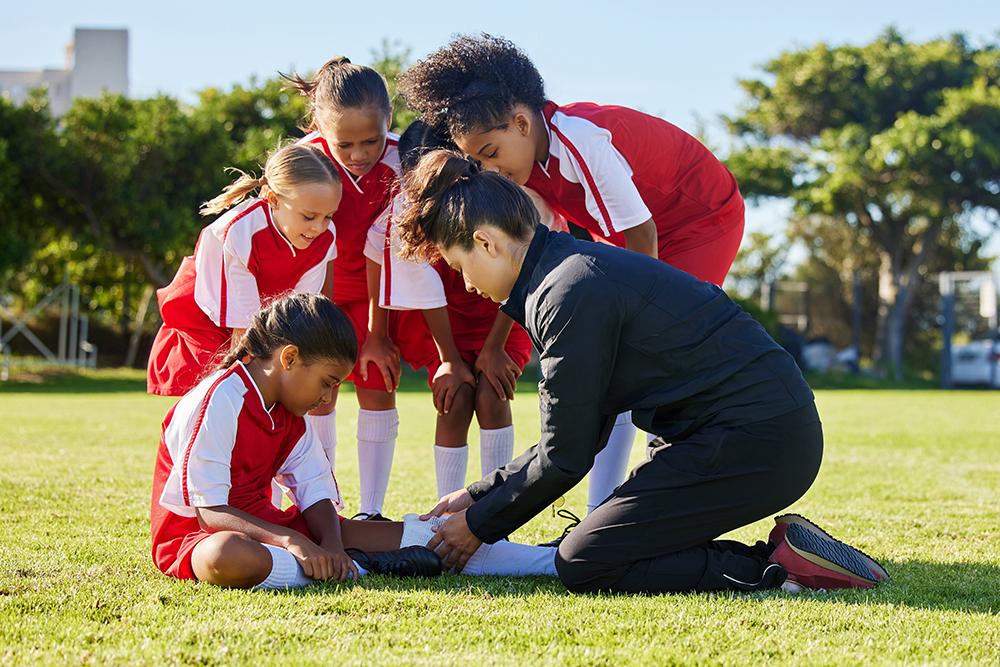 In these uncertain times, parents of student athletes are tasked not just with keeping kids safe and educated, but also with taking care of their physical and mental wellness. For coaches, this time is a crossroads: You can either leave athletes to their own devices, or you can help them prepare to come back stronger than ever when the time comes.
In these uncertain times, parents of student athletes are tasked not just with keeping kids safe and educated, but also with taking care of their physical and mental wellness. For coaches, this time is a crossroads: You can either leave athletes to their own devices, or you can help them prepare to come back stronger than ever when the time comes.
Whether you’re a coach or a parent, keeping kids active and healthy is of the utmost importance during stressful and confined circumstances, especially when athletes are used to full school and training schedules. Here are some ways to keep your young athletes healthy and happy during quarantine.
Talk to your athletes
Whether you get on a Google Hangout, Zoom conference call, or just a group email chain, staying in touch with your athletes is important in situations like this. Coaches have an opportunity to be true leaders by keeping athletes’ sense of connection, morale, and self-identity high. A weekly team meeting is a good place to start.
Another way to create healthy connection is by starting a “leaderboard” in Google Sheets for the players to record drills they’ve done, mobility exercises accomplished, minutes spent meditating, and any other healthy activities that you assign.
Thomas Cooke, a soccer and Nordic skiing coach in Park City, Utah, says that his team has started a Google Sheets leaderboard and “challenged every player to get 2,000+ touches a day, with a breakdown of individual drills and games.” He adds that the key is to keep it fun and game-like.
Parents and coaches can stay in touch too! Parents, ask coaches for specific drills and suggestions where applicable, and coaches, consider sending a list of specific recommendations to parents.
Be empathetic
These are emotionally trying times, as sports and events are canceled that athletes have been working toward and looking forward to for months or even years.
“Above all else, it is prudent for parents to show empathy,” says Nadia Kyba, MSW, TrueSport Expert, and President of Now What Facilitation. “This means trying to make a connection to the emotions that your youth athletes are feeling. If you are a parent, think of a time that you have felt a similar emotion and go there.”
While you’ve never experienced this exact situation, you’ve surely experienced a time when an event you were looking forward to was canceled, as well as times of turmoil and uncertainty. Share those experiences with your athlete now, whether you’re a parent or a coach.
Encourage your athletes to stay in touch with teammates
Teamwork and a team culture aren’t things that just happen on the field: They should be nurtured throughout the year, and now more than ever, athletes need their communities. FaceTime allows up to 31 users in a shared session, and apps like Google Hangouts and Zoom have free options for athletes to stay in touch as well.
TrueSport Expert Kevin Chapman, a licensed clinical psychologist and founder of the Kentucky Center for Anxiety and Related Disorders, notes that at times like these, contact with teammates is essential for mental wellness. “Try to utilize technology as much as possible. Make sure your athlete is staying in touch with teammates and maybe doing some workouts together virtually,” he recommends.
Keep them moving inside
When kids are inside most of the day, a sedentary lifestyle becomes a problem. But research has shown that just 30 minutes of any type of movement per day can help mitigate the effects of sitting most of the day. That could mean 10 minutes of yoga in the morning, plyometrics in the yard in the afternoon, a session on a stationary bike or any other aerobic equipment, or even some deep cleaning of the basement, attic, or garage.
Work on mental skills
Between practices, games, and workouts, it’s normally rare for coaches to have the chance to focus on mental skills with athletes. Use this as a chance to revisit some of the mental aspects of sport, from visualization drills to reviewing old footage of games to establishing meditation practices.
“Practicing visualization has been shown to be a powerful tool, but most coaches don’t utilize it with younger athletes,” Chapman says. “This is a great chance to work on that mental strategy.” He’s also a fan of the Headspace app for learning how to meditate and recommends it to athletes regularly.
Find some online resources for your athletes
Right now, there are thousands of free videos for yoga, mobility, strength, and even sport-specific skill building that can be done at home with minimal equipment. Cooke notes that his soccer players are using videos for “1-player, 1-ball” drills that can be done inside in very tight spaces. There are also plenty of homebound experts, from sports psychologists to registered dietitians, who would be happy to host video chat information sessions or question-and-answer sessions for students.
Give athletes “healthy living” and “continuing ed” assignments
It’s easy in times like this to allow your student athletes to retreat to their computers or couches to binge-watch TV, but you can help your athlete make the most of this extra screen time. This may mean finding healthy recipes online, or even doing some long-term athlete development by reading books about training and their specific sport.
“Donovan Mitchell, who plays for the Utah Jazz and was diagnosed with COVID-19, is passing time streaming games and playing with teammates, but he’s also going back and watching his own highlights and watching his progression to learn from that,” Chapman adds.
Limit COVID-19 screen time
“It’s so important to limit how much screen time athletes have as it relates to COVID-19,” says Chapman. “It’s easy to spend hours and hours reading social media and news coverage about it, but that’s going to increase anxiety. Kids can stay informed, of course, but shouldn’t be spending the entire day online.”
And while it may be difficult right now to cut back on screen time in general, studies suggest that more than two hours of screen time can be detrimental to a child’s development, so find a healthy limit.
Keep them moving outside
Depending on where you live, there may be regulations around getting outside for exercise. If there aren’t, make sure that your athlete spends time in nature running, hiking, cycling, or walking.
Kids can also practice sport-specific drills in the backyard, or even step back from a specific sport by playing fun games like croquet, darts, volleyball, and badminton. A vigorous game of badminton or volleyball helps develop footwork and object control that can support skill development in a variety of other sports, explains Michele LaBotz, TrueSport Expert and sports medicine specialist.
Establish routines
Bedtime may not seem as important when there’s no school to wake up for in the morning, but continuing with a regular routine will be better for your athlete’s health. “It’s important to maintain a routine and set a schedule every day,” says Kyba. “Kids thrive under these conditions. For athletes in particular, routine is their normal. The worst thing that can happen is to let days slide by, leaving kids on their phones and without goals to work toward.”
TrueSport Expert Kristen Ziesmer, a registered dietitian and board-certified specialist in sports dietetics, suggests having your kids help with simple kitchen chores like doing the dishes, cutting up fruits and vegetables, washing produce, putting dishes away, planning out meals and shopping lists, and helping to prepare breakfast, lunch, and snacks.
Avoid boredom snacking
With lots of free time, everyone is tempted to fill the void with food, even when they aren’t hungry or the food isn’t healthy. To prevent boredom snacking, Ziesmer recommends that kids:
- Ask themselves if they would eat celery or a less desirable food. If the answer is no, then they should leave the kitchen empty handed.
- Assess hunger with a 1-10 scale. On the scale, 1= hangry, 3= hungry/ready to eat, 5= satisfied, 7= full, 10= way overfull. If you’re above a 4, then you need to find something else to do.
- Do an activity that requires hands and concentration, such as art, knitting, or building something.
Parents should also limit the amount of junk food in the house and the amount of TV binging, which is when mindless eating often occurs.
Catch up on sleep
In October 2019, the American Academy of Pediatrics released research showing that nearly half of children in the U.S. aren’t getting enough sleep. The researchers noted that a chronic lack of sleep for adolescents is associated with “physical and mental health consequences, including increased risk of depression and obesity and negative effects on mood, attention, and academic performance.” Use this time to allow your athlete to catch up on sleep and establish healthier habits now.
____________
Takeaway
While this is a time of uncertainty and tough circumstances, there are still many ways to care for your athlete’s physical and mental wellness, and there are even some new opportunities to take advantage of during these less structured times. Remember to also help your athletes take a few moments throughout the day to be mindful of what’s happening in the moment and to take note of the things they can be grateful for.



